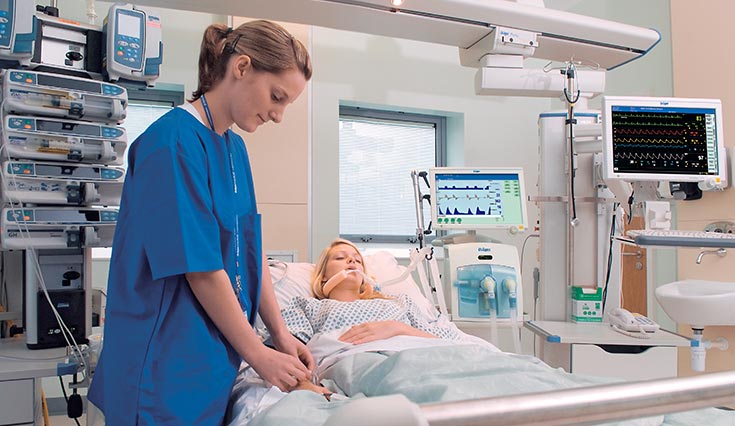
Most respiratory therapists work at the bedside, and the majority of them care for patients who fall into the adult category. Delivering care to these patients is what therapists train for. They also train to deliver care to the sickest of those patients in the ICUs.
But not every therapist is suited to a full-time career in the critical care units. Maria Madden, MS, RRT, RRT-ACCS, chair of the AARC’s Adult Acute Care Section, explains what it takes to succeed in this high-pressure environment.
How would you describe the adult critical care setting to RTs who would like to make this area the focus of their career? How does it differ from delivering routine care on the floors?
Unlike therapy on subacute care floors, intensive care units in adult critical care provide a fast-paced, high-stress, yet supremely rewarding avenue for talented clinicians to practice respiratory care. Respiratory therapists who choose to focus in adult critical care must possess the ability to rapidly assess extremely ill patients in an ever-changing environment. Quick, correct, and evidence-based decision-making is vital to success for the patients and also the clinician providing the care.
Adult critical care RTs have opportunities for employment in emergency rooms, trauma centers, and intensive care units focusing on surgical, medical, neuro, ECMO, and trauma care. As adult critical care respiratory therapists, it is paramount we continue our quest for knowledge and actively seek out advancing our profession. Dedicated, proactive, knowledgeable patient advocates who are experts in mechanical ventilation strategies, airways, medication delivery, and secretion clearance strategies assure the respiratory therapist’s place at the bedside. What are the educational, credentialing, and experience requirements to grow a successful career in this area of the profession?
In my previous roles as clinical coordinator in trauma and departmental educator for a staff of 180 RTs, I experienced very well-prepared new graduates from accredited programs over four states. All had varying individual backgrounds, some associate’s prepared and some bachelor’s prepared. My recommendation to all is to continue your education as far as possible! If you have an associate’s degree, pursue your bachelor’s. If you have your bachelor’s, pursue your master’s. It has been said that an education “opens doors.” This is a wise statement and one that has my full support. One of my most rewarding experiences, which also assisted me in a successful career, was continuing my education and obtaining my master’s degree in respiratory leadership from Northeastern University.
Having administrative, nursing, and physician support is also paramount to building a great critical care team. Cooperation and partnerships between respiratory care, nursing, and the physician team are essential in caring for the critically ill. Credentialing is also essential. Pass that CRT, get your RRT, then challenge yourself with the ACCS! I promise you’ll be proud of your efforts, and you just may motivate others to follow in your footsteps.
What kind of therapist does best in this setting — i.e., what are some of the personal characteristics that people need to have to cope with the fast pace and high stress that comes with working in the ICUs?
I love this question! The RTs that thrive in adult critical care have strong personalities and do not shy away from a challenge. They have a level of confidence to support their decision making and they are self-starters. They are able to take constructive criticism and tactfully provide it as well. They have a thirst for knowledge and enjoy participating in the education of others. High performers here are often found joining hospital-based initiatives outside of the respiratory care department. Finally, these RTs have a level of mental toughness that assists during the rough patches and a soft side that allows them to share in the recovery of their patients.
What opportunities for career advancement does the setting offer?
The critical care environment and potential for advancement for respiratory care are at an all-time professional high! We have proved ourselves an essential member of the ICU team, with our notoriety growing year after year. The COVID-19 pandemic truly brought our work to the mainstream public. With this, our roles continue to evolve and develop. As critical care respiratory therapists, we can transition toward roles as ECMO specialists, educators, research coordinators, diaphragm pacing coordinators, consultants, product representatives, and organ transplant coordinators, as well as into leadership positions, to name some of the many possibilities. What are the biggest challenges and the biggest rewards of working in adult critical care and why?
Some of the biggest challenges are also the most rewarding! The shifts you feel the best about your performance are the shifts you’ve worked the hardest. All it takes is witnessing a critical care patient under your care being discharged ventilator-free. In my 30 years in the field, it just never gets old!
What are the top 3-4 things you think an RT should possess before deciding to commit to a career caring for critically ill patients in the ICUs?
- Passion
- Patience
- Understanding
- Thirst for knowledge
Learn more about the Adult Critical Care Specialist exam available from the NBRC here. To network with colleagues in adult acute care, join the AARC’s Adult Acute Care Section.





